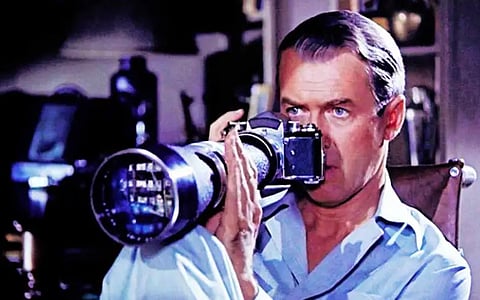
- Reviews
- Power List 2024
- Cannes 2024
- In-Depth Stories
- Web Stories
- News
- FC Lists
- Interviews
- Features
- FC SpecialsFC Specials

Rear Window is an Alfred Hitchcock masterpiece that can make you laugh and take pity on the misery of life, all at once. Released in 1954, it was a window into the 'modern' world and captured the barrenness of human existence. The plot was loosely based on a short story written by Cornell Woolrich titled It Had to be Murder.
The story is placed from the vantage point of Jeff, an injured photographer who is restricted to his apartment. His lack of mobility sways him towards a new hobby: mindlessly spying on his neighbours. However, things turn south when he witnesses a murder in the process and stops at nothing to reveal the killer.
By elaborating on the themes of isolation and a sense of despair, the film opened the chambers to the 'quarantine' feeling that several people witnessed during the peak of the pandemic. Jeff used to observe his neighbours through his window and every tiny frame had a story to tell. It is interesting to note how despite living within such close proximity, none of the neighbours shared any physical contact with each other. While the lockdown kept us apart for medical reasons, we can't deny that as a society we have grown detached from a sense of community.
The pain of losing our loved ones often brought out our egocentric tendencies and pushed us to move into a shell. Living alone was also not healthy for many because they did not want to be left with their negative thoughts in an empty house. They contemplated their lack and tried to find ways to change how they feel. The portrayal of Miss Lonelyhearts in the film served a similar function. She was named so because her lack of romantic engagement made her fantasize about an ideal date where she used to dance and serve food to an imaginary man. Once, she even invited a real date to her apartment, but he ended up molesting her and pushing her towards the desolation she was trying to escape.
Another character was the songwriter who separated from his wife and was trying to cope with his spoiled marital life. He felt hollow from inside and his musical notes were a form of self-reflection. Towards the end of the film, this songwriter's tunes stopped Miss Lonelyhearts from committing suicide and that was the beginning of a new story for them. Several incidental relationships such as these were formed during the pandemic because people were helping each other deal with their trauma and work towards a better future.
Being desensitized toward death was yet another theme that is common between the film and our battle with the pandemic. The deaths were treated as numbers rather than loss of living entities. After a point, people fell out of ways to emotionally respond to that stature of loss. In the film, there is a couple who always sleeps on the balcony. They were a pair who were extremely affectionate towards their dog and treated him as their child, indicating their inability to conceive their own children. In the chaos around the murder in their neighbourhood, their dog was killed. None of the members of their community expressed their grief towards his death and that disheartened the couple. The lady screamed from their balcony, "The dog was the only one who liked you neighbours!" hinting at the apathy of society.
The beginning of several scenes featured a woman mindlessly napping on the lawn. She is never seen performing any other activity or even being awake. She is seen in the same position throughout the day and is unaware of the incidents taking place around her. She is an accurate representation of the burnt-out adults who finally found peace in the sweetness of doing nothing. It is an image of the halt the world came to after continuous running.
The beauty of rewatching films is captured in the hindsight it offers to individual and global events. In an evolving society, looking back provides a beautiful perspective for understanding the present and films are a wonderful way to get there.